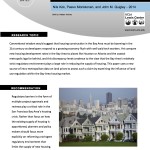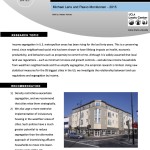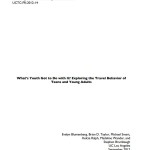Housing
The Lewis Center carries out research in four major dimensions of housing policy in order to inform and guide policy with evidence and to highlight the topics about which we need to learn more. We currently focus on the greater Los Angeles region, but many issues are highly relevant to other parts of the state and country.
People
Issue Briefs
Is Los Angeles Destroying Its Affordable Housing Stock to Build Luxury Apartments?
Los Angeles has a severe shortage of affordable housing, and newly-constructed housing is typically more expensive to rent or buy than older multifamily units nearby. Many fear that, because LA is short on vacant parcels zoned for multifamily homes, these older, more affordable units will inevitably be demolished to make way for new, more expensive housing. In this brief, we investigate whether or not this is occurring and what the answer means for the city’s response to the housing crisis.
How Proposition U Restrains Los Angeles Housing Development
Proposition U, approved by LA voters in 1986, permanently and dramatically decreased the amount of permitted development based on lot size, significantly contributed to the city’s notoriously low-slung urban form, and curtailed the potential of its commercial corridors. In this brief, we examine how the measure prevents the development of thousands of new infill housing units on top of retail that could create transit-oriented, mixed-use communities in a way that protects the equity and stability of surrounding neighborhoods.
Overcoming Opposition to New Housing
Proposals for new housing development often meet significant resistance from those that benefit most from its scarcity, homeowners and landlords, while too few advocate for upending the existing pattern of zoning and increasing construction in neighborhoods of opportunity. In this brief, we explain how opponents of new housing use California’s planning and political systems to their advantage, and offer recommendations for reforms that help increase housing supply and reduce the unequal spatial distribution of new development.
Residential Preference Policies
Neighborhood residential preference policies attempt to curb residential displacement by setting aside units in new developments for people who live in the immediate area. Many people and agencies that these policies are in conflict and violation of the Fair Housing Act as they limit access to new residential units. In this brief, we explain the delicate balance between open access to housing and gentrification concerns with examples from San Francisco, New York City and Los Angeles.
Measure S
While there is no shortage of debate on Measure S, the public dialogue has been relatively uninformed about the likely consequences of the Measure, in part due to difficulties in working with the various data sources on permitting and housing construction in Los Angeles. In this brief, our best assessment of the available research and data leads us to conclude that if the Measure passes, rents and property costs in the Los Angeles region are likely to rise even faster than they are already.
Policy Briefs
 Not So Fast: Traffic Delays, Access, and Economic Activity in Greater Los Angeles and the San Francisco Bay Area
Not So Fast: Traffic Delays, Access, and Economic Activity in Greater Los Angeles and the San Francisco Bay AreaBy Andrew Mondschein, Taner Osman, Brian D. Taylor, Trevor Thomas
Released: December 2016
 Rules of Estrangement: Local Land Use Regulation in the San Francisco Bay Area
Rules of Estrangement: Local Land Use Regulation in the San Francisco Bay AreaBy Nils Kok, Paavo Monkkonen, and John M. Quigley
Released: May 2014
 Rules of Division: The Influence of Land Use Regulation on Income Segregation
Rules of Division: The Influence of Land Use Regulation on Income SegregationBy Michael Lens and Paavo Monkkonen
Released: April 2015
 Greenhouse Gas Reduction Close to Home: Local Efforts to Curb a Global Phenomenon
Greenhouse Gas Reduction Close to Home: Local Efforts to Curb a Global PhenomenonBy Juan Matute
Released: February 2011
Latest Publications
 Sustainable Los Angeles: Lessons from Vancouver
Sustainable Los Angeles: Lessons from VancouverBy Aaron Ordower, Sandra Caballero, Daryl Chan, Aysha Ruya Cohen, Michael Janusek, Brittany Jang, Ben Kaufman , Naria Kiani, Laura Krawczyk, Rachel Lindt, Jeff Loi, Brianne Masukawa, Casey Osborn, Jimmy Tran
Released: May 2015
 What’s Youth Got To Do With It? Exploring the Travel Behavior of Teens and Young Adults
What’s Youth Got To Do With It? Exploring the Travel Behavior of Teens and Young AdultsBy Evelyn Blumenberg, Brian D. Taylor, Michael Smart, Kelcie Ralph, Madeline Wander, Stephen Brumbaugh
Released: September 2012


